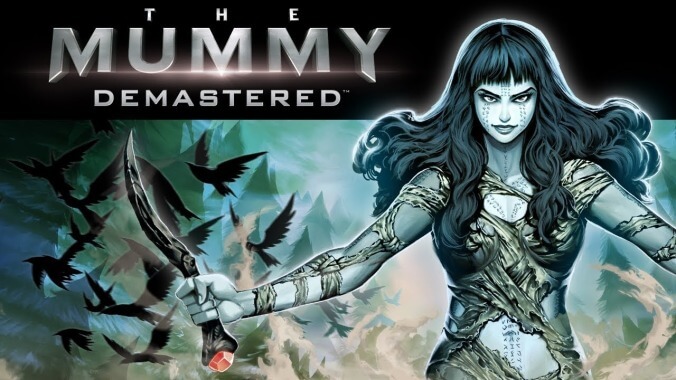Last year’s terrible Mummy movie inspired a shockingly good game

Every Friday, A.V. Club staffers kick off our weekly open thread for the discussion of gaming plans and recent gaming glories, but of course, the real action is down in the comments, where we invite you to answer our eternal question: What Are You Playing This Weekend?
The Mummy Demastered
Back when it came out last summer, our film editor, A.A. Dowd, said that “seeing Tom Cruise get his ass kicked” was one of the only good things about Universal’s latest attempt to reboot and serialize The Mummy. As strange as it sounds, I’d like to nominate The Mummy Demastered as another positive (in addition to the amazing, messed-up version of the trailer that was missing a bunch of sound). Coming from the veteran developers at WayForward and available on PC, Switch, PlayStation 4, and Xbox, it’s a 2-D action game loosely based on the movie where you, as a faceless soldier dude, get guided around a bunch of caves by your commanding officer, pixelated Russell Crowe.
It’s 100 percent a Metroid and Castlevania clone—down to the look of the map you build up as you explore the rooms full of infinitely spawning zombies—but it’s a surprisingly solid one, with great-looking sprite art, animations, and a decent synthwave soundtrack. Demastered also has a neat gimmick for handling death, forcing you to track down and kill your now-zombified former self after every game-over. There’s too much of a premium placed on shooting for my taste (the third element in its retro video game stew is Contra), so I wouldn’t say it ranks with last year’s best Metroid-style games. But with the likes of Hollow Knight and Rain World leading that pack, it’s an especially tough hurdle clear.[Matt Gerardi]
Scythe
If you’ve dabbled in modern board games at all, you’ve likely played a Euro-style “worker placement” game, whether you know what the terms mean or not. These are often gentle games with deceptively pastoral themes, with the action more about quietly allocating resources and building out efficiencies rather than interacting with your opponents. The platonic ideal of this style is Agricola, a wonderfully designed game in which you and some friends each independently build a little farm, with animals and hearths and seasonal harvests and everything. It is, despite or perhaps because of this docility, an absolutely maddening experience. Over the course of an hour or two, you steadily place workers to bundle sticks and gather sheep, and the moment the farm is taking shape, the game ends. You tally things up, see which asshole friend of yours invested in cows early enough to win, and that’s it. Game over.
2016’s smash hit Scythe rejiggers the worker-placement mold in two ways—the first and most rewarding of which is by letting you take that fucking farm to war as the game goes on. (Technically, it’s an entire kingdom, but the feel is the same.) While you’ll be allocating little workers for the game’s entire playing time, you share the map with your opponents and can eventually hop over to a neighboring kingdom and straight up steal their stockpile of wood. Further, all of the players are funneled toward the center of the map, practically demanding that players stare each other down in the heat of battle at some point or another. The game thus retains all the absorbing engine-building action of other Euro-style games while still accommodating a more, shall we say, American desire for conquest, bloodshed, and heated arguments among friends. The rulebook even encourages you to make treaties—and lie about them.
Scythe’s other great innovation, hinted at by its name, is to wrap all this ur-board game innovation into what may be the most painterly exterior ever to grace a tabletop release, a mythic reimagining of countryside conflicts fought with giant mechs. It’s Valkyria Chronicle’s Japanese take on European history drawn not with anime floridity but a more stolid, impressionistic brush, with endless gray skies casting a somber mood over these turf wars. Because of this, Scythe has developed a reputation as something of a perfect board game—complex but easy to learn, accommodating of both militaristic and more pacifist playing groups, long enough to feel like a satisfying engagement but short enough to fit in on a weeknight. It works just as well for a couple as it does for half a dozen people. You can even play the damn thing solo, something I am, for the first time in my board-game-playing career, tempted to do between sessions with my regular playing group. I can almost hear the cardboard box shaking on the shelf, whispering that there are carefully built little homesteads out there, ripe for the plunder. It’s Agricola for assholes, and I love it. [Clayton Purdom]